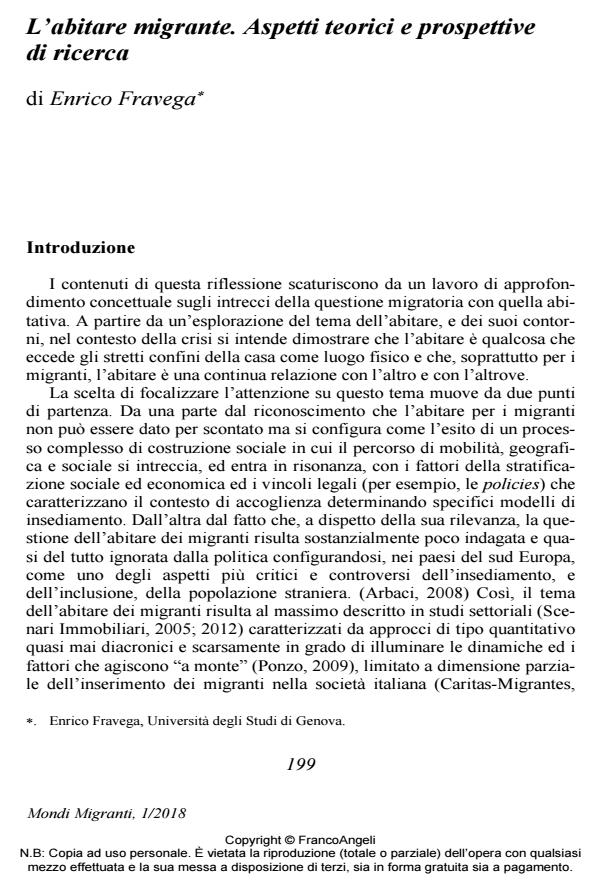The Migrant Housing. Theoretical aspects and research perspectives
Journal title MONDI MIGRANTI
Author/s Enrico Fravega
Publishing Year 2018 Issue 2018/1
Language Italian Pages 25 P. 199-223 File size 251 KB
DOI 10.3280/MM2018-001010
DOI is like a bar code for intellectual property: to have more infomation
click here
Below, you can see the article first page
If you want to buy this article in PDF format, you can do it, following the instructions to buy download credits

FrancoAngeli is member of Publishers International Linking Association, Inc (PILA), a not-for-profit association which run the CrossRef service enabling links to and from online scholarly content.
The article starts from the acknowledgment that housing for migrants cannot be taken for granted but is rather the result of a complex process of social construction in which the social and geographical mobility path are interwoven with the social, and economic, stratification factors as well as the legal constraints distinguishing any national context. Housing is not (only) an economic fact. Talking about housing indeed requires a continuous referring to "other worlds". To the world of the family, for example. To Memory or to personal identity. To travels or to homeland. And, further, to the homeless condition. Talking about housing - then about "house" and "home" - of migrants, then, means crossing many different "provinces of meaning" getting in touch with the spheres of everyday life. Thus housing it is a source of personal identity, status and family security and it can contribute, in a more and more globalized world, in fostering a sense of place and belonging. In different housing patterns are recognizable cultural schemes and "lebenswelts" because the house can be a place of memory and nostalgia but also a creative and emotional space, simultaneously local and global, crossing time and space; and can be, at the same time, positive and negative. Through housing is possible to place a border, even porous and mobile, between the private, the public and the common sphere. The house, in other way said, is not (merely) an object whose properties are clearly defined but is the field of multiple tensions between different provisional meanings flowing through it. As for migrants, their transnational families on the one hand, and their real estate investments in the home countries highlight that "home" and "outside" are relative concepts. Not necessarily in opposition one to another. Addressing the issue of migrants housing involve therefore taking a perspective allowing the inclusion of the heterotopic aspects of housing within the field of observation and to focus the attention, as well, on the housing practices, on the transition phases from one place to another, from a state of homelessness to the house, or vice versa. Hence, assuming the idea that housing is to be considered as the outcome of a social construction process in which objective and subjective, emotional and material aspects resonate and sometimes get contradictory in a continuous process of meaning construction.
Keywords: Migrants; immigration; housing; housing policies.
- Tra crisi e nuove disuguaglianze sociali. La distribuzione spaziale degli immigrati a Genova- (Materiali supplementari) Alessandra Terenzi, Silvia Crivello, in SOCIOLOGIA URBANA E RURALE 133/2024 pp.1
DOI: 10.3280/SUR2024-133005oa - Gaining/regaining housing stability through collective action: Individual uses and social functions of a migrants’ collective residence Laura Ferrero, in Radical Housing Journal /2020 pp.123
DOI: 10.54825/HNLZ5568 - Segregazione residenziale etnica o di classe? Evidenze empiriche dal caso bolognese Maria Grazia Montesano, in SOCIOLOGIA URBANA E RURALE 133/2024 pp.51
DOI: 10.3280/SUR2024-133004 - The interrelation between migration and homelessness. Searching for inclusive solutions in the local context Marta Salinaro, Marta Ilardo, in EDUCATION SCIENCES AND SOCIETY 2/2023 pp.310
DOI: 10.3280/ess2-2023oa16430 - Tra crisi e nuove disuguaglianze sociali. La distribuzione spaziale degli immigrati a Genova Alessandra Terenzi, Silvia Crivello, in SOCIOLOGIA URBANA E RURALE 133/2024 pp.66
DOI: 10.3280/SUR2024-133005 - Le conseguenze economiche, sociali e scolastiche della pandemia da Coronavirus per le famiglie immigrate e per i loro figli in EDUCATION SCIENCES AND SOCIETY 1/2021 pp.56
DOI: 10.3280/ess1-2021oa11758 - La segregazione abitativa nelle città del Sud Europa. Il Selam Palace: un insediamento informale a Roma Fabiola Midulla, in MONDI MIGRANTI 1/2024 pp.117
DOI: 10.3280/MM2024-001008 - "A permit to stay, but no place to stay": Former unaccompanied minors experiences of rental racism as ‘adults' in Bologna Sarah Walker, in MONDI MIGRANTI 3/2025 pp.191
DOI: 10.3280/MM2025-003009 - Interstitial urban spaces: housing strategies and the use of the city by homeless asylum seekers and refugees in Trento, Italy Giuliana Sanò, Giulia Storato, Francesco Della Puppa, in Social Anthropology /2021 pp.976
DOI: 10.1111/1469-8676.13084
Enrico Fravega, L’abitare migrante. Aspetti teorici e prospettive di ricerca in "MONDI MIGRANTI" 1/2018, pp 199-223, DOI: 10.3280/MM2018-001010